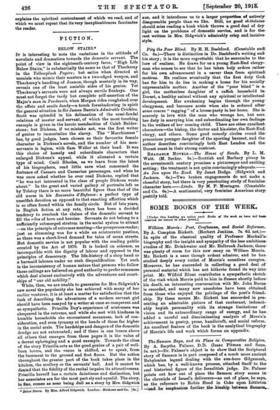FICTION.
BELOW STAIRS.*
Below Stairs. By Mrs. Alfred Sidgwick. London : Methuen and Co. tea.)
IT is interesting to note the variations in the attitude of novelists and dramatists towards the domestic servant. The point of view in the eighteenth-century farce, " High Life Below Stairs," is substantially the same as that of Thackeray in the Yellowplush. Papers ; but satire when directed at menials who mimic their masters is a two-edged weapon, and Thackeray's handling of Jeames, though masterly in its way, reveals one of the least amiable sides of his genius. Yet Thackeray's servants were not always servile flunkeys. One must not forget the tardy but complete self-assertion of the Major's man in Pen dennis, when Morgan rides roughshod over the effete and senile dandy—a touch foreshadowing in spirit the general situation in Sir James Barrie's Admirable Crichton. Scott was splendid in his delineation of the semi-feudal relations of master and servant, of which the most touching example is given in the heroic mendacities of Caleb Balder. stone ; but Dickens, if we mistake not, was the first writer of genius to immortalize the slavey. The " Marchioness " has, by good judges, been chosen as their favourite female character in Dickens's novels, and the number of his men- servants is legion, with Sam Weller at their head. It was this choice of homely and subordinate characters that enlarged Dickens's appeal, while it alienated a certain type of mind. Cecil Rhodes, as we learn from the latest of his biographers, read little save what concerned the fortunes of Caesars and Caesarian personages, and when he was once asked whether he ever read Dickens, replied that "he was not interested in the class of people Dickens wrote about." In the great and varied gallery of portraits left us by Tolstoy there is no more beautiful figure than that of the old nurse in his Souvenirs d'Enfance: a perfect type of unselfish devotion as opposed to that exacting affection which is so often found within the family circle. But of late years, in English fiction at any rate, there has been a decided tendency to overlook the claims of the domestic servant to fill the rules of hero and heroine. Servants do not belong to a sufficiently submerged stratum in the social system to attract —on the principle of extremes meeting—the prosperous reader; just as slumming was for a while an aristocratic pastime, so there was a short-lived demand for tales of mean streets. But domestic service is not popular with the reading public created by the Act of 1870. It is looked on askance, as incompatible with the dignity of labour and opposed to the principles of democracy. The life-history of a shop hand or a barmaid labours under no such disqualification. Yet such is the inconsistency of human nature that persons who follow these callings are believed on good authority to prefer romances which deal almost exclusively with the adventures and court- ships of " our old nobility."
While, then, we are unable to guarantee for Mrs. Sidgwick's new novel the popularity she has achieved with many of her earlier ventures, it is at least a matter for satisfaction that the
task of describing the adventures of a modern servant girl should have been essayed by a writer at once so competent and
so sympathetic. Priscilla Day's experience of mistresses was chequered in the extreme, and while she met with kindness in bumble households she encountered meanness, lack of con- sideration, and even tyranny at the bands of those far higher in the social scale. The hardships and dangers of the domestic drudge are not extenuated ; and if there is one lesson above all others that emerges from these pages it is the value of a decent upbringing and a good example. Towards the close of the story Priscilla acts as the good genius of a pair of well- born lovers, and the venue is shifted, so to speak, from the basement to the ground and first floors. But the action throughout the greater part of the book takes place in the kitchen, the scullery or the servants' hall. And it cannot be denied that the fidelity of the recital impairs its attractiveness. Priscilla herself has a certain daintiness and distinction, but her associates are for the most part sly and squalid. The story, in fine, comes as near being dull as a story by Mrs. Sidgwick
can, and it introduces us to a larger proportion of actively disagreeable people than we like. Still, no good eluitelaine• should miss reading a book which throws a good deal of dry light on the problems of domestic service, and is for the- rest written in Mrs. Sidgwick's admirably crisp and incisive style.










































 Previous page
Previous page